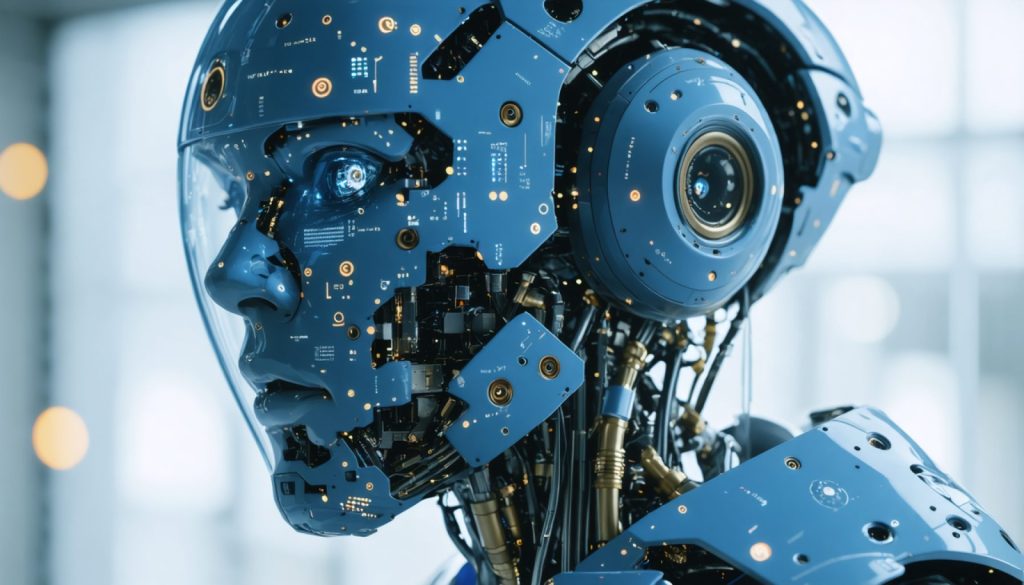
- Artificial Intelligence (AI) is reshaping global industries, transitioning from science fiction into tangible technological advancements.
- In Africa, Strive Masiyiwa leads efforts to establish the continent’s first AI factory, fostering local innovation and startup growth.
- China leverages AI to innovate agriculture, aiming for sustainable farming through intelligent machinery and policy-driven R&D efforts.
- India plans its own AI chip within three years, reducing reliance on foreign semiconductors, under the Ministry of Electronics and Information Technology.
- The private sector in North America and Europe is crucial, with companies like Philips advancing AI in healthcare and shaping economic growth.
- AI promises to revolutionize various fields, offering significant opportunities for investors and driving a technological renaissance.
Artificial Intelligence, often hailed as humanity’s most transformative creation, is not just a futuristic dream—it’s a current reality reshaping industries across the globe. Picture a world where algorithms lend their “thoughts” to human endeavors, sparking innovation in ways once confined to science fiction. We stand at the brink of AI achieving cognitive abilities akin to our own, a prospect fueling a surge of advancements from Africa to Asia, with impacts reverberating in agriculture, healthcare, and technology.
On the African continent, the pioneering efforts of Strive Masiyiwa aim to position Africa as a powerhouse in AI development. He envisions the continent’s first AI factory as a cradle for innovation, where bold ideas spring to life without needing foreign shores. This ambitious project promises to accelerate local research and startup growth, creating a self-reliant hub teeming with potential breakthroughs.
In the fertile fields of China, AI’s influence on agriculture promises to transcend traditional farming methods. The government is orchestrating an evolution, harnessing AI to power intelligent machinery. Draft policies encourage research and development, establishing innovation hubs that transform data and human interactions with machines, all in a bid to optimize yield and sustainability.
India, never one to lag behind, is crafting its own AI destiny. With aspirations for an indigenous AI chip poised to debut within three years, India strives to break free from external semiconductor dependency. This initiative, led by the Ministry of Electronics and Information Technology, aims to reinforce the nation’s standing on the global AI stage.
In this landscape, the private sector emerges as an indispensable force. Across North America and Europe, businesses steer government initiatives toward tangible results. They carry the weight of AI’s potential, their efforts forming the backbone of economic and technological progress.
Consider Koninklijke Philips N.V., a torchbearer in medical innovation. Renowned for holding the crown in medical technology patents in Europe, Philips exemplifies AI’s application in healthcare. By incorporating AI into systems like the EPIQ CVx and Affiniti CVx ultrasound, Philips enhances cardiovascular imaging, revolutionizing patient care and alleviating costs. Such advancements not only spotlight AI’s current utility but signal greater possibilities ahead.
The overarching narrative is one of transformation and opportunity. AI, with its boundless applications, is set to redefine industries, promising not just evolution but revolution. For investors, this signifies landscapes rich with potential. As AI continues to expand its reach, those poised to leverage its capabilities may find themselves at the forefront of the next great technological renaissance.
Ultimately, the AI revolution is not a distant frontier but a burgeoning reality—one that unravels new pathways for creativity and growth on a global scale.
Unlocking the Future: How AI is Reshaping Industries and Everyday Life
The Impact and Potential of Artificial Intelligence Across the Globe
Artificial Intelligence (AI) is no longer a vision confined to the realms of science fiction. It is a robust reality profoundly transforming industries around the world, fostering innovation, and paving the way for a future where machines and humans collaboratively drive progress. From Africa’s burgeoning tech scenes to Asia’s agricultural innovations, AI’s global influence can’t be understated. Below are further insights into this technological evolution.
How AI is Revolutionizing Key Industries
1. Agricultural Advancements in China:
– AI is revolutionizing agriculture by optimizing farming practices. In China, AI-driven intelligent machinery and predictive analytics are utilized to enhance crop yield and sustainability. This is crucial as the country strives for food security amidst a growing population.
– Life Hack: Farmers can leverage drone technology with AI for precision agriculture, leading to reduced waste and increased efficiency in irrigation and fertilization.
2. Healthcare Innovations by Philips:
– Philips is at the forefront of integrating AI in healthcare, transforming cardiovascular imaging and diagnostics. Their AI-enabled systems, like the EPIQ CVx and Affiniti CVx, are pivotal in reducing diagnostic times and improving patient outcomes.
– Security & Sustainability: AI systems in healthcare must prioritize data security, ensuring patient confidentiality and compliance with regulations like the GDPR.
3. Semiconductor Independence in India:
– India’s ambition to produce indigenous AI chips within three years could revolutionize its tech industry. By reducing dependency on imports, India aims to bolster its tech economy and encourage domestic innovations.
– Actionable Tip: Companies should invest in local semiconductor production to benefit from reduced costs and increased supply chain resilience.
4. Private Sector Leadership in North America and Europe:
– In these regions, the private sector plays a crucial role in actualizing government AI strategies. Companies are at the helm of creating AI applications that drive economic growth and technological breakthroughs.
Addressing AI’s Pressing Questions
– What are AI’s limitations?
– While AI offers immense benefits, it’s limited by issues such as bias in algorithms, ethical concerns around data privacy, and the need for substantial computational resources.
– Controversy: The ethical implications of AI, especially in surveillance and privacy, remain hotly debated topics.
– How can businesses adopt AI effectively?
– Organizations can start by identifying processes that benefit from automation and invest in AI research and development partnerships.
– How-To Steps: Begin with scope assessments to understand AI’s applicability, pilot small projects, and scale successful programs across the business.
– What is the market forecast for AI?
– AI is expected to catalyze global economic growth, with forecasts predicting the AI industry could add trillions to the global economy over the next decade.
Actionable Recommendations for Businesses and Individuals
– Invest in AI Education: Upskilling employees through AI courses will ensure businesses stay competitive.
– Leverage Data Analytics: Use AI-powered analytics to gain actionable insights into consumer behavior, enhancing decision-making processes.
– Prioritize Ethical AI: Implement frameworks that ensure AI is used responsibly and aligns with ethical guidelines.
By embracing these strategies, businesses and individuals can effectively navigate and capitalize on the AI-driven future.
Related Resources for Further Exploration
For more comprehensive information on AI advancements and industry applications, explore resources from leaders like Intel and IBM.
Embracing AI effectively requires recognizing both its potential and its challenges, ensuring a balanced approach that maximizes benefits while mitigating risks. As AI continues to evolve, its impact will undoubtedly unlock unprecedented opportunities across industries worldwide.



